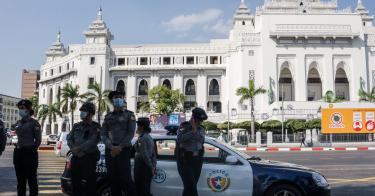The military leaders in Burma (which the generals-in-charge like to call Myanmar) have scraped the veneer of democratic rule off the ugly military authoritarian regime that has hidden just below the surface for years.
The thugs that really run the country have dabbled in everything from political repression to organized crime and genocide. Their brazen action offers some insight for the fledgling Biden administration on how to deal with the world’s bad boys.
The junta would object to calling their overt takeover a "coup." They would argue that what they did is consistent with the country’s constitution. And they should know. They wrote the constitution.
Still, the notion that military leaders can just toss out an elected government whenever they want is pretty abhorrent to those who believe in human liberty. And "abhorrent" is le mot juste, whether you call it a coup or not. At the end of the day, Burma’s military leaders are nothing but thugs.
Let’s be candid. The civilian government was far from perfect. Arguably, the civilian rulers were complicit in the persecution of the Rohingya and other minorities in the country—some of the worst human rights abuses in the world today. Still, a freely-elected civilian government—no matter how misguided—offers a more promising future for the Burmese people and the region than iron-fisted military rule.
This sad turn of events offers some lessons for President Biden’s team as they take over the task of keeping Americans safe, free and prosperous in a sea of world-troubles.
The number one lesson is don’t reflexively go back to Obama policies. Much in the way he lightened up on Cuba, Venezuela, Russia and Iran, Obama tried normalizing relations with Burma. He backed off sanctions, expecting that our generosity would trigger better behavior. That naïve strategy failed with Burma, just as it did in those other countries.
>>> How The U.S. Should Respond To The Coup In Burma
The fact is, despite donning the trappings of democracy in 2010, those who wore military uniforms in Burma never gave up power to the suits or sarongs in parliament. (Indeed, the constitution reserves at least 25% of the seats in parliament for the military.)
The generals merely wanted to create the illusion of representative government to give the international community cover—cover to justify "engagement" and to turn a blind eye to the regime’s continued misdeeds.
Unfortunately, that cynical strategy worked—not least with Washington.
The generals are likely to stick with their so-far-successful gambit. They’ll set new timetables for transitioning to democracy, and hope that will be enough to get them another 10 years of engagement and averted eyes among civilized nations.
The Biden administration and Congress should not buy it. The notion that Washington can jump-start a democracy agenda by engaging with the Burmese military is a fantasy.
So far, the Biden team is playing it right.
On Sunday, the administration demanded that the military release the civilian leaders it has detained and warned it would "take action" if the junta didn’t back off. On Monday, the administration said it would consider reinstating at least some of the sanctions against the regime that had been relaxed over the last decade. The best step the Biden team could take is slap those sanctions back in place—fast and hard.
The new administration should also draw another lesson from the antics of Burma’s military:
The U.S. can expect nothing but a confrontational, blunt and unambiguous relationship with Beijing. The fact that China is prepared to prop up this regime (and other odious authoritarian regimes like Venezuela and Iran)—even in the face of international opprobrium—is a reminder that Beijing is anything but a constructive force on the world stage.
The argument that we cannot be too tough on Burma because that will give room for the Chinese to consolidate its relationship with the military leadership is complete nonsense. Beijing’s relationship with Burma already far outstrips Washington’s. This same logic vis-à-vis competition with China is what led the U.S. to normalizing relations in the first place. It did not work.
The U.S. should now look to re-impose sanctions lifted or waived over the last decade. We lifted faster and more broadly than reforms on the ground in Burma justified. The "coup" bears out this judgment.
This piece orignally appeared in Fox News




